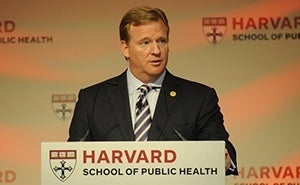[ Winter 2013 ]
Quick updates about the latest public health news from across the School and beyond.
New online course reaches worldwide audience
This fall, more than 50,000 students enrolled in the new course “Health in Numbers: Quantitative Methods in Clinical and Public Health Research”— but none of them showed up in class. Instead, they logged in to watch lectures and participate from computers around the world. The course, co-taught by E. Francis Cook, professor of epidemiology, and Marcello Pagano, professor of statistical computing, was one of two inaugural offerings by Harvard as part of edX, the online education platform launched last May by Harvard and MIT; the University of California, Berkeley joined in July. The new public health course, along with other edX offerings, will become part of a growing library of courses available in coming years.
AB Blood types at highest risk for heart disease
Knowing your blood type may help you manage your risk for heart disease. Recent research suggests people with blood type AB, B, or A may be more vulnerable—with type AB linked to the highest risk (20 percent). By contrast, people with blood type O may be at relatively low risk. The finding comes from an HSPH study led by Lu Qi, assistant professor in the Department of Nutrition and at Brigham and Women’s Hospital, and published by the American Heart Association. Qi said, “If you know you’re at higher risk [with A, B, or AB blood type], you can reduce the risk by … eating right, exercising, and not smoking.”
Author describes battle with breast cancer
 In her new book Beauty Without the Breast, Felicia Knaul documents her personal struggle with breast cancer, and the challenges faced by her family—including her children and her husband, HSPH Dean Julio Frenk. The book also focuses on the hurdles confronting women with cancer throughout the world. Poor women in low- and middle-income countries, she writes, encounter not only the disease, but also stigma and poor access to health care. Knaul is director of the Harvard Global Equity Initiative and associate professor at Harvard Medical School.
In her new book Beauty Without the Breast, Felicia Knaul documents her personal struggle with breast cancer, and the challenges faced by her family—including her children and her husband, HSPH Dean Julio Frenk. The book also focuses on the hurdles confronting women with cancer throughout the world. Poor women in low- and middle-income countries, she writes, encounter not only the disease, but also stigma and poor access to health care. Knaul is director of the Harvard Global Equity Initiative and associate professor at Harvard Medical School.
Sleep apnea and poverty: a double threat to health
Sleep apnea—which occurs when the throat closes during sleep, resulting in snoring and periods when breathing briefly but repeatedly stops— is a relatively common and underdiagnosed condition that hits minorities and low-income individuals particularly frequently, according to a September 7, 2012, Huffington Post blog post co-authored by Michelle Williams, SM ’88, ScD ’91, HSPH’s Stephen B. Kay Family Professor of Public Health and chair of the Department of Epidemiology, and Susan Redline, MD, of Brigham and Women’s Hospital. Their blog post identified contributing factors such as exposure to tobacco smoke and higher levels of obesity as underlying causes of sleep apnea, with obesity itself potentially a result of the sleep deprivation sleep apnea causes. Sleep apnea can have profound health effects, including increased risk for high blood pressure, heart failure, stroke, diabetes, abnormal heart rhythms, pregnancy complications, and early death.
Mexico’s milestone: universal health coverage
Seguro Popular, Mexico’s ambitious health insurance program, has achieved universal coverage in less than a decade, despite economic downturns and domestic crises. HSPH Dean Julio Frenk, in his previous role as Mexico’s Minister of Health from 2000 to 2006, was the architect of reforms that enabled the enrollment of 52.6 million previously uninsured Mexicans. However, according to a paper by Dean Frenk and other researchers and public health officials—published online in The Lancet on August 16, 2012, and in the print edition on October 6, 2012— issues regarding quality and access to care remain.
Stick to your diet—any diet
 High-fat, low-fat, gluten-free, protein-rich: Diet crazes never go out of style. But according to Eric Rimm, associate professor in HSPH’s Departments of Epidemiology and Nutrition, there is no “magic bullet” for losing weight. The best diet, he said, is the one that you can easily stick to over time. “Adherence,” he said, “rules the day.” He spoke on July 31, 2012, at his HSPH “Hot Topics” summer lecture, “Deconstructing Popular Weight Loss Diets.”
High-fat, low-fat, gluten-free, protein-rich: Diet crazes never go out of style. But according to Eric Rimm, associate professor in HSPH’s Departments of Epidemiology and Nutrition, there is no “magic bullet” for losing weight. The best diet, he said, is the one that you can easily stick to over time. “Adherence,” he said, “rules the day.” He spoke on July 31, 2012, at his HSPH “Hot Topics” summer lecture, “Deconstructing Popular Weight Loss Diets.”
Lift weights, lower diabetes risk
Attention, men: Want to reduce your risk of developing type 2 diabetes by up to 34 percent? Try regular weight training. By up to 59 percent? Add regular aerobic exercise to the weight training. These are the findings of the first study of its kind by Harvard School of Public Health (HSPH) and University of Southern Denmark researchers.
The doctors we love to hate
General practitioners, surgeons, plastic surgeons, dermatologists, obstetricians/gynecologists: in Australia, these physicians tend to draw the most complaints from patients, according to an analysis compiled by David Studdert, HSPH adjunct professor of law and public health, and a research team from the University of Melbourne in Australia. The researcher described his team’s findings in an address at HSPH on July 3, 2012. Studdert unveiled the predictive tool his team developed to identify higher-risk doctors, whom he calls “frequent fliers.” Dubbed PRONE (PRobability Of New Events), it is a scoring system that factors in a doctor’s age, gender, and specialty, as well as prior complaints against the physician.
In memoriam: Paul Densen
Paul Densen, professor emeritus of community health and medical care, died on July 9 at the age of 98. Densen became the inaugural head of the Harvard Center for Community Health in 1968 and helped train and mentor its postdoctoral fellows in social science research. Densen also was deputy commissioner of health in New York City and held positions in the Veterans Administration and the Health Insurance Plan of Greater New York.
A pioneering biostatistician, Densen introduced the concept of using statistical analysis to estimate and adjust actuarial health insurance risk. He served as a consultant to the federal government and the military on health maintenance systems. Densen received numerous awards and honors, including selection for membership in the Institute of Medicine, part of the National Academy of Sciences.
HSPH convenes world health leaders to help Ethiopia
There are more Ethiopian doctors in Chicago than in Ethiopia, said Keseteberhan Admassu, Ethiopia’s State Minister of Health. At a gathering of world experts assembled by HSPH’s Department of Global Health and Population and the Yale Global Health Leadership Institute in July 2012, Admassu described his country’s “brain drain” of emigrating physicians and other challenges to delivering and financing basic health services. Conferees from Brazil, Estonia, South Africa, Sri Lanka, Thailand, and the Organization for Economic Co-operation and Development shared their countries’ approaches with a selected group of Ethiopian health officials as Ethiopia begins to draft a 20-year plan to improve primary care delivery. With funding from the Bill & Melinda Gates Foundation, Ethiopia has enlisted Harvard and Yale to help it develop affordable and sustainable health care delivery solutions as the nation prepares to become a middle-income country.
From survival to growth: Emphasizing a baby’s first thousand days
 In India and other low- and middle-income countries, undernourished women give birth to low-birthweight babies—who grow up to be underweight adults, often with reduced mental capacities and susceptibility to disease and premature death. In his August 14, 2012, “Hot Topics” lecture, “Linked Lives: Intergenerational Influences of Health in Low- and Middle-Income Countries,” SV Subramanian, HSPH professor of population health and geography, offered a solution: “It’s the first thousand days [of a baby’s life] that count … We have to get to homes of parents with new babies and deliver nutrition. If you wait until the child is in school, it’s too late. We want to move away from a ‘survival agenda’ to a ‘growth agenda.’”
In India and other low- and middle-income countries, undernourished women give birth to low-birthweight babies—who grow up to be underweight adults, often with reduced mental capacities and susceptibility to disease and premature death. In his August 14, 2012, “Hot Topics” lecture, “Linked Lives: Intergenerational Influences of Health in Low- and Middle-Income Countries,” SV Subramanian, HSPH professor of population health and geography, offered a solution: “It’s the first thousand days [of a baby’s life] that count … We have to get to homes of parents with new babies and deliver nutrition. If you wait until the child is in school, it’s too late. We want to move away from a ‘survival agenda’ to a ‘growth agenda.’”
Changing football culture
 Discussing the sport’s evolving commitment to player safety, National Football League commissioner Roger Goodell delivered the Dean’s Distinguished Lecture and fielded questions from HSPH faculty and students on November 15, 2012. Goodell noted that the league was doing more than ever to prevent concussions and other serious injuries, but added that football’s “warrior mentality” must also change. “We want players to enjoy long and prosperous careers and healthy lives off the field,” he said.
Discussing the sport’s evolving commitment to player safety, National Football League commissioner Roger Goodell delivered the Dean’s Distinguished Lecture and fielded questions from HSPH faculty and students on November 15, 2012. Goodell noted that the league was doing more than ever to prevent concussions and other serious injuries, but added that football’s “warrior mentality” must also change. “We want players to enjoy long and prosperous careers and healthy lives off the field,” he said.
Iron imbalance in TB patients: Too much is as bad as too little
Tuberculosis patients whose iron levels are too high or too low may be more vulnerable to faster disease progression or death, according to an HSPH study conducted in Tanzania between 2000 and 2005. Led by Sheila Isanaka, research fellow in the Department of Nutrition, investigators analyzed blood samples and data from 705 adults with TB—half HIV-infected, half uninfected. Low levels of iron were linked to an increased risk of treatment failure for all patients, and of TB recurrence in HIV-infected patients. High levels of iron were linked to an increased risk of death in all patients. Isanaka says these findings “highlight that iron imbalance—at either end of the continuum—may pose risks for TB patients and underscore the need to better understand the role of iron in TB pathogenesis and disease progression.”
— Magazine
Download a pdf of Winter 2013 Frontlines
